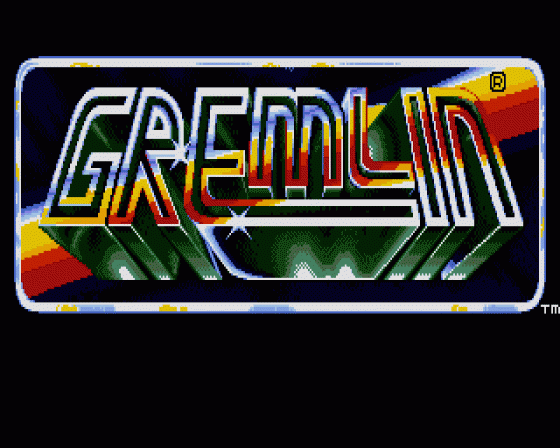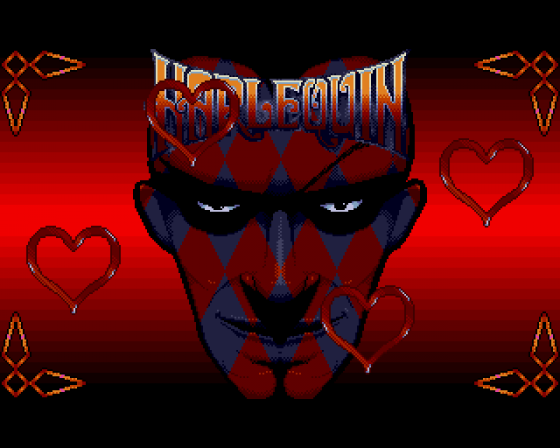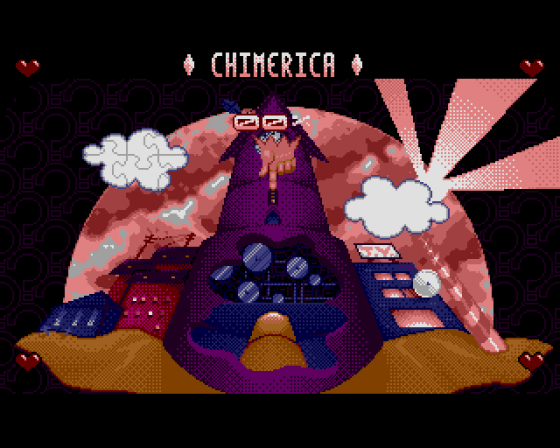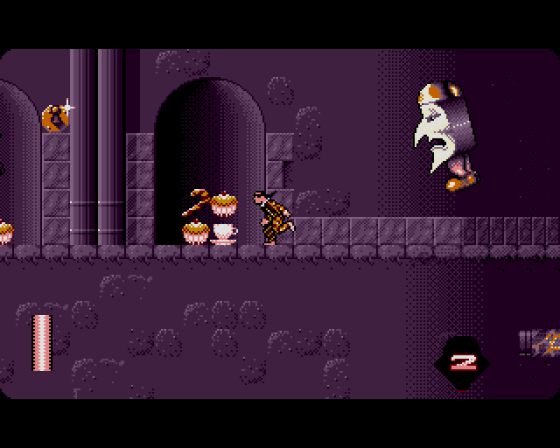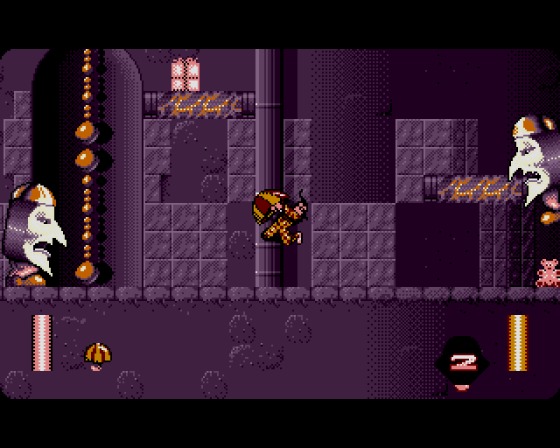
Future Publishing
 8th January 1992
8th January 1992
Harlequin
However death and destruction-orientated the majority of today's arcade-based software may have become, it's nice to see that it's still possible to base exhilarating games around non-violent, almost girly themes. Take the Harlequin, for example. Anybody who covers their face in make-up and wears a frilly pyjama suit not unlike Andy Pandy's would hardly sound like the ideal hero for a bells-and-whistles platform extravaganza. But hero he is, and a surprisingly hard one at that. In Gremlin's latest arcade effort - and undoubtedly their most impressive to date - the diamond-clad central character comes across as one of the most athletic game stars since the Prince Of Persia or the great Sonic himself.
In a nutshell, what we're dealing with here is a cross between Robocod and Gods. Harlequin makes very little effort to disguise the fact that these two platform favourites have obviously been important influences, but the sheer excellence with which it manages to pull off a successful marrying of the two game styles makes this pretty much forgivable.
If, after looking at the screenshots here, the player still has any doubts about the "Watch With Mother" look and feel of Harlequin, he need only read the scenario to have any such doubts extinguished utterly. Apparently, the Harlequin has returned home (from the shops, perhaps? Why are such important details always left out?) to find his land in a state of disrepair (sic). It may sound slightly dodgy, but the idea is that Harlequin actually lived inside a giant clock cum palace called Chimerica. Now the giant main doors are barred and a sign on the giant clock reads "Out of order due to broken heart". So, to restore peace and harmony to the land, Harlequin's got to search Chimerica's giant lands - all 23 of them - and recover the four pieces of said broken heart which have been scattered to the four winds.
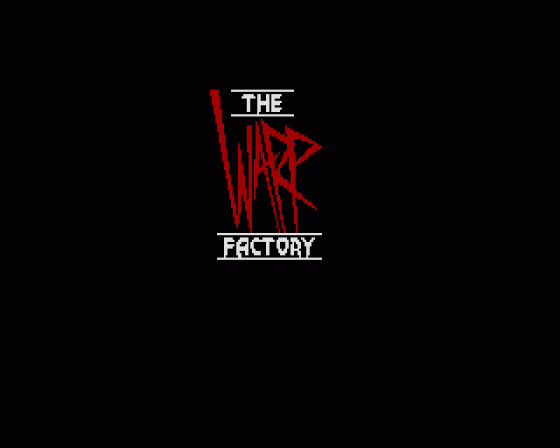
Okay, okay, so it's not exactly The Grapes Of Wrath - but then John Steinbeck couldn't write a decent scrolling routine, so it all sort of levels out in the end! If your knowledge of Harlequins ends with the Rugby team and the rather nice Terry's chocolate assortment (previously Neapolitans), you won't know that Harlequins are in fact more than just namby-pampy silky boys in baggy trousers and a Dick Turpin hat. In fact, they are endowed with bizarre magical powers, which accounts for the game's mythical, almost surreal graphical style.
Harlequin's progress around the Chimerica world is charted by a giant map of the game area which appears before each level with helpful "YOU ARE HERE" arrows. Generally, the route taken seems to be specified by the program, with one level leading automatically to the next, but more thorough players will find that, by experimenting with switches and the like, portals can be opened to alternative levels, allowing the player to go through the game via a number of different routes. Whatever the deal, the objective for each individual level remains the same throughout - get to the exit.
It is, of course, a far trickier task than that rather potted summing-up may suggest - the very nature of the huge, eight-way scrolling levels makes them difficult to negotiate. It's not that the levels and platforms have been designed in a particularly nasty fashion - well, they have, but that's not really the point - it's the landscapes' sprawling, open-plan style a la Robocod that creates the main challenge.

It's easy enough just to get lost, as there's no definite route to follow, with any number of ways to get from A to B. It's a little daunting at first, to the point of instilling a sense of agoraphobia and being perpetually lost, but things soon sort themselves out as soon as the player orientates himself and gets a feel for where things are.
Actually, this sprawling level design isn't entirely my bag as I'm a lazy gamesplayer and can't stand having to find my own way through big landscapes - I must prefer to have a few helpful arrows dotted around here and there to point me at least more or less in the right direction.
I was surprised, therefore, to find that I was nowhere near as frustrated or put off by Harlequin as my first few minutes of watching someone else play it suggested I might be. Though there are plenty of times when there doesn't seem to be a way forward or you're just plain lost, the game always manages to compel the player to find the solution.

It's mostly due to the fact that, on a basic arcade level, the game never lets up. Wherever Harlequin may be, it's a good bet that some trap or energy-sapping minion will be after him. It may be something as simple as a dripping tap or elaborate as a giant flying snake, but there are virtually no safe havens within the game, and, as a result, virtually no time to sit still.
Though Harlequin is first and foremost a platform game, it does boast arcade adventure elements. The most important one is the important part that switches play in the game - every level has a few dotted around the landscape, and they perform different tasks when thrown. A switch may unlock a door or exit, put a platform in motion or otherwise alter the landscape somehow.
The situation of these switches often forces the player to work his way all the way around the level rather than just heading straight for the exit. I'm a little unsure, though, as to how well these switches work. Often the application of a switch is obvious - you hit it and a platform starts moving, for example.

In other situation, however, there's no indication of what happens when a switch is thrown because whatever the switch has affected may be in a completely different part of the level. Obviously there wouldn't be much of a point having locked doors if the switch that unlocks them is right next to them, but it can get a tad annoying when you hit a switch and then have absolutely no idea what it is you've done. Some kind of visual or audio clue would have been helpful, without giving the game away entirely. Oh well, you can't have everything - although it'd be nice.
In addition to switches, the Harlequin world is densely littered with all manner of goodies, the vast majority of which come hidden in jack-in-the-boxes waiting for the player to open. The yummies available range from energy-giving sweets and cakes to more useful items like an umbrella, which slows Harlequin's descent when falling and allows him to drift downwards like a parachutist (useful when high up, as long drops sap energy), a space hopper for super bounce power, little firework rockets that fly in circles around the player and act as a shield and, perhaps most esoteric of all, a magic thingy that turns Harlequin into a diamond-patterned Anglefish when he lands in water. Without one, the player drowns immediately, and that's the end of that, but with the fishy power, there are whole underwater caves, much like Mario's, waiting to be explored.
Undoubtedly, one of Harlequin's most pleasing features is the central character's remarkable flexibility and acrobatic ability. He runs and jumps like an everyday game geezer, but he also has the ability to crawl through narrow tunnels, slide down diagonal platforms a la Strider and swing, Tarzan-style from the large Pendulum-like devices that are commonplace inside Chimerica's giant workings.

The effect, especially to the casual observer, is very much in the same high-spirited skin-of-the-teeth adventure vein as games like Strider and the afore-mentioned Prince Of Persia. Joystick control is super-sensitive and thoughtful, with the player able to change Harlequin's direction completely in mid-jump and fire at any time, regardless of his position. Actually, it's arguable that Harlequin is a little too comfortable, as it's easy to oversteer, even though there's no inertia to speak of - something just ever-so-slightly more sluggish would probably have resulted in the player making fewer aggravating mistakes.
Enemies come in all shapes and sizes - the specific type varies on the level, but there are some generic types that crop up throughout the game in different graphics guises. Harlequin's only defence against these big bad boys is a stream of hearts, which travel in a short downwards arc like the fireballs in Ghouls 'N Ghosts. Initially they're pretty weak, but a power-up which turns them from pink to deep red increases both their range and hit power. Conceptually, it sounds a bit dodgy (I for one have certain reservations about a game where my primary weapon is not a light sabre or a machine gun but a pink heart), but if you block that out of your mind the weapon-firing side of things can be quite frenetic and pleasing. It's a combination of the fact that the player can choose at all times, regardless of what else he may be doing, and the rapid rate of fire.
As a pyrotechnical display, Harlequin is at its best in situations where there's a lot going on. Generally, when things happen, they do so in an elaborate fashion. Baddies explode into lots of little bits, and the jack-in-the-boxes open amidst a shower of stars and spangly things. It gives the impression of there being lots of action and things being very busy, even when in real terms there may not be much happening.

It also makes Harlequin feel very much like a console game - there are times when it looks quite Megadrive-y, in fact - and that atmosphere is backed up by an impressive array of sound effects, which range from the mundane (like the explosions) to the just plain silly, like the excited "Wheeee!" that Harlequin utters whenever he slides down a diagonal platform. Though there's no in-game music and some of the effects have a primitive C64-ish sound to them (which I actually quite like), Harlequin is as much an assault on the ears as it is on the optic nerves.
Despite the fact that at first glance it may look like a straight Robocop rip-off, Harlequin is actually a surprisingly fresh and original game - not really when viewed in a broad, general sense, as the major aspects like objectives and character control are nothing new, but when looked at as the sum of its individual parts.
It's the multitude of smaller ideas and innovative touches, like the space-hopper and fish bits and jumping "into" the television screens to take part in the programmes they're broadcasting that make the difference and lift Harlequin out of the ordinary.

Unlike something like Gods, Harlequin doesn't hit the player too hard with mobile enemies - with the exception of a few levels, alien attacks are sporadic, and they tend to come on singularly rather than in big waves of six or eight at a time.
As such, the game's difficulty can be attributed much more to the size and design of the levels themselves. The panoramic, open-plan nature may be somewhat off-putting for gamers who are used to playing in a more claustrophobic, controlled environment, but ultimately what it adds up to is all the more challenge - if you're up to it.
So then, is it any good or what? After all the pontificating, the simple answer is a definite yes. Harlequin impresses both technically and in gameplay terms, and stimulates the intellect and adrenal glands in equal amounts. It's far from perfect, and I doubt there'll be anyone who doesn't find something that gets on their tits in one way or another, but the game doesn't make any major mistakes, and for the most part everything it tries to do, it does spot on target.

Programmers The Warp Factory get an extra shiny star in their margins for making such a good job out of such unlikely subject matter, and anyone who appreciates the surreal or bizarre are in for a special treat here. An acquired taste to be sure - but one you'd do well to acquire.
Hop, Skip And Jump
Phew! This Harlequin chappy sure is an athletic fellow. Momentum plays an important part in his movement, so taking a long run-up allows him to leap a lot further than he would be able to from a standing start.
Like Strider, he can slide down diagonal surfaces (even super-thin ones like telegraph lines and tightropes) and hang from ceilings, although climbing is a bit much to ask.
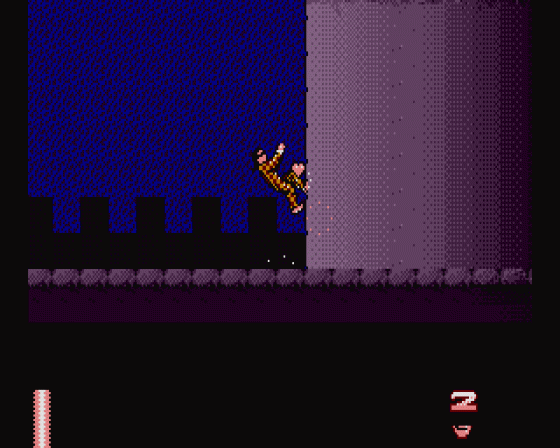
As the player progresses, he'll find that many aspects of the landscape are just ripe for Harlequin to make athletic use of in one way of another - two of which are shown below. But beware - where something useful is going on, it's a good bet that something equally nasty is taking place nearby, threatening progress.
Compare And Contrast
Comparing Harlequin to any one game directly is not an easy task - primarily because it's more like a mish-mash of elements from many other platform products.
The best description is a cross between Robocod and Gods. Initially it seems more like Robocod than anything else, but this just proves that first impressions can be deceiving, as the only real similarity is the huge high-speed eight-way scrolling play areas.
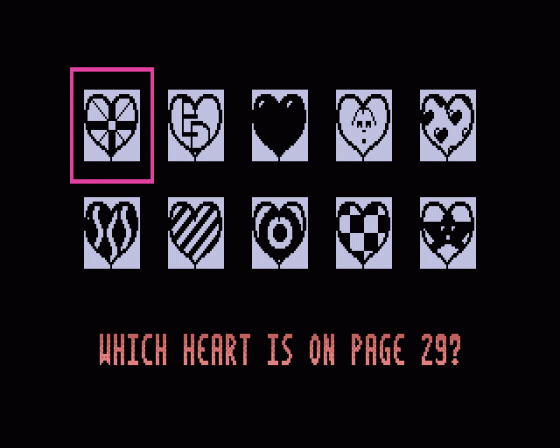
Harlequin has far more sophisticated character control, and this combined with the arcade adventure aspects makes it a lot like Gods in that respect. At a push, I'd say that Harlequin's greater variety makes it slightly more rewarding than Robocod, even though a lot more effort is required to get into the game.
So far as Gods is concerned, Bros' effort is no match for the speed of Harlequin, although that game's more involved object handling and intelligent aliens make it a better bet for gamers in search of a deeper challenge.
Uppers
- Superlative, high-speed scrolling action.
- Athletic character control, always something happening.
Downers
- Really quite difficult actually!
- More varied weaponry wouldn't have gone amiss.
Verdict
Despite Harlequin's arcadey depth, it's deceptively easy to get into - the first few screens present not too much of a challenge, allowing the player to build confidence - which is then utterly destroying by the ferociousness of what happens next.
It's true, Harlequin is a very difficult game, and not one for novice platformers. All you seasoned veterans, however, will undoubtedly lap up the challenge it has to offer. The difficulty curve is well-graded. The game's graphic niceness provides extra incentive, as there is a strong compulsion to find out what the next level looks like.
Less patient players may well lose sight of Harlequin's charms as soon as the going starts to get tough, but there is no doubt that the rewards are there for players willing to persevere.
23 levels may not sound like a lot, but each one is large and action-packed enough to guarantee muchos fun on a constant basis for at least the next few months.


